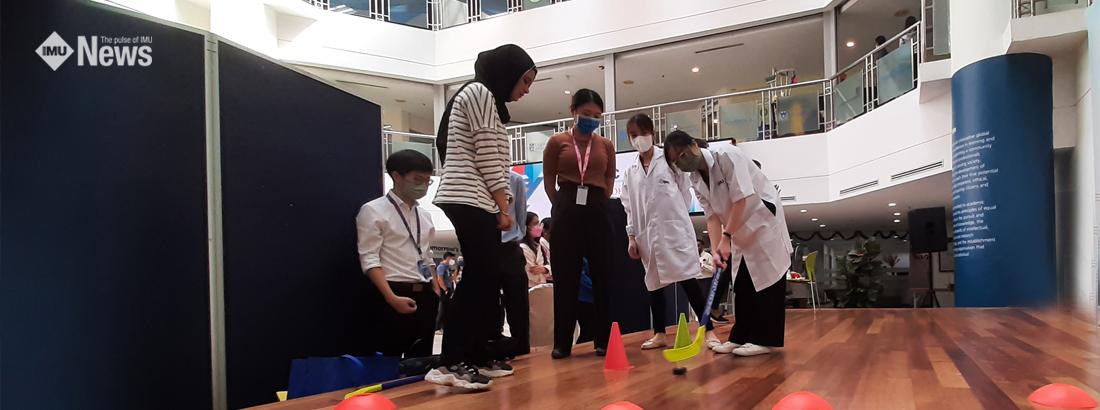Imagine learning about high performance sports through play.
The Sports and Exercise Psychology module is a selective offered in IMU’s BSc (Hons) in Psychology programme. It is taught by Mr Alexius Cheang, a Senior Lecturer who was a former Head of Sport Psychology at the National Sports Institute and who was also the psychologist for the national badminton and shooting teams.
On 6 October 2022, students were assigned to a tutorial session at the Ekspo Industri Sukan KL 2022, which was located at the Bukit Jalil Stadium, about a 5-minute walk from the IMU campus. This sports industry expo provided students with the opportunity to widen their perspectives on Malaysia’s sports industry through a showcase of activities, talks, booths, products, as well as further education in sports.
Raja Putri Hasya Qistina commented that this event was one of the first hands-on and interactive tutorials that she had experienced outside campus, and it had broadened her view on different career paths that she could go into if she ever wanted to have a sports related career.
Tan Ni Ki on the other hand enjoyed herself and had fun by participating in many different activities and exhibitions as she learned more about the Master of Sport Science course, sport therapy, as well as the wide variety of sport equipment on display. She tested her skills in virtual golf putting and also showed courage by trying the outdoor flying fox, which was set up outdoors alongside activities like rock climbing, and even abseiling.
Despite her fear of heights, Chan Xin Yi demonstrated great courage by volunteering to participate in the flying fox after observing many of her classmates enjoying it. Although she screamed in terror when she reached the top of the platform, she was able to complete it successfully thanks to her bravery in trying something new, which marked a significant milestone in her personal growth.
Another student found tremendous personal meaning at the punching bag machine, where a few of her classmates were punching the bag while the rest of the class cheered for them when the scores went up. Kimmie Tu was initially hesitant because she didn’t think she was strong enough to get pass a score of 100. Eventually, she gave it a go and scored 230. Seeing that she had underestimated her own strength, she set a higher goal of 300 for herself and after a few trials, she achieved the goal with a score of 324! She realized that her classmates cheering her on increased her motivation and improved her performance.

Khadijah Fakih meanwhile was strongly impacted by an exhibition booth called ‘Safe Sport’, which is a movement targeted towards women in the sporting industry who play sports competitively yet feel unsafe whilst doing so.

The movement aims to raise awareness by providing a safe environment for female athletes and to educate the public about the different issues and challenges that occur within the sporting industry that contribute to making female athletes feel unsafe. She felt incredibly inspired by the founder and how confident and strong a woman she was while spreading such an important awareness on this topic.
Besides the visit to the sports expo, multiple tutorials incorporated sports toys as demonstration tools on topics such as arousal regulation, mental imagery, self-confidence, goal setting and concentration, which made the tutorials really competitive as well as fun while students learned to incorporate the skills that were taught.

The students then applied these skills to showcase various activities during a demonstration held in the IMU atrium, providing an opportunity for students from other programmes to observe and attempt them.
During the concentration activity, participants aimed to score higher points by throwing shuttlecocks into increasingly smaller containers. They were instructed on how to improve their concentration by transitioning from a broad to a narrow focus utilising positive self-talk, and employing a thought-stopping technique to eliminate negative thoughts.
At the mental imagery booth, participants played mini golf by navigating through various obstacles and counting the number of strokes it took to finish the course. They were instructed to use mental imagery to visualize precisely where they wanted to direct the hockey puck and to follow through physically. Although the task may have seemed easy, successfully executing it posed a challenge.

Arousal regulation was demonstrated by hooking up participants to a biofeedback machine which displayed their heartbeat rate and skin response. Participants were then shown 3 short, scary clips throughout the activity and were then measured on how fast they were able to stabilise their heart rate and skin response, in other words, to calm themselves through the use of thought management and self-talk strategies.
All these activities were at the forefront of teaching this course as Mr Alexius is a strong believer in adapting book knowledge into real-world practical applications. Together with the students who took this module, they had a lot of fun while learning and challenging themselves along the way, and it is hoped that the students will transfer the knowledge and experience gained to multiple work environments in their future.
Written by Alexius Cheang









